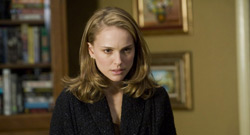At first glance, Brothers feels like it should be a soap opera. Here’s the setup: Sam Cahill (Tobey Maguire) is an upstanding, red-blooded Marine captain being deployed to Afghanistan, leaving his beautiful wife Grace (Natalie Portman) and two daughters behind in idyllic suburbia. At the same time, Sam’s brother Tommy (Jake Gyllenhaal) is released from prison. He’s the family blacksheep—into drugs, drunkenness and petty theft. In Afghanistan, Sam’s Black Hawk helicopter is shot down. He’s presumed dead, and Grace and the family hold a memorial service stateside to say goodbye.
The now widowed Grace tries to press on and raise her girls without their father. Uncle Tommy, meanwhile, steps in to help Grace raise little Isabelle and Maggie, and in the process discovers that he actually likes the world of fatherhood. He softens, cleans up his act, and even renovates Grace’s kitchen. Everything lines up for the once-shunned Tommy to become the new father to the girls and maybe husband to Grace. But then Grace gets a phone call. Her husband Sam is alive, just rescued from an Afghan prison camp. He’s coming home, but to a much more complicated family situation. And after experiencing some truly horrific things in Afghanistan, Sam’s a much more complicated man.
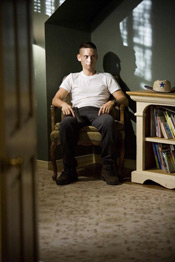
But lest you expect that this scenario translates into a sordid, melodramatic love triangle out of the Days of Our Lives script archive, you should know that Brothers is a nearly scene-for-scene American remake of a 2004 Danish arthouse film directed by Susanne Bier (After the Wedding). That film was less about sensationalism than it was about subtlety and Nordic restraint (echoing the Dogma style of Lars von Trier, but with a kinder touch), and for the most part the American version follows suit. Jim Sheridan (In America) helms the new version, with a script adapted by David Benioff (The Kite Runner).
There are several ways in which the American version of Brothers differs from its Danish counterpart, but chief among them is the American-ness of Sheridan’s film. From the first shot of an American flag at an army base to the “quarterback and cheerleader” storybook Americana of Maguire and Portman’s relationship, all against the backdrop of a vaguely nostalgic/western guitar score by Thomas Newman, Brothers is firmly rooted in American culture. The Cahills could be any red state military family in America—a meatloaf and potato-eating, quilt-sewing, “Bless Our Home” churchgoing family whose patriarch grandpa is a grizzled Vietnam vet (Sam Shepard) who carries a flask even to church. The Cahills are thoroughly identifiable and relatable, equal parts loving and dysfunctional, stable and tenuous. But the same could be said for the family in the Danish version. Which begs the question: Why see this American version when the Danish original will do just fine?
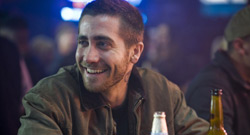
The best answer is probably that Sheridan’s version features bigger name actors who shine in a film that is largely an actor’s showcase. Maguire and Gyllenhaal are impressively nuanced in the “could easily be overdone” brother roles. They look the part of brothers and it’s truly a wonder they’ve never been paired as siblings in a film before. Portman also delivers a powerfully understated (and not overly sentimental) performance, as a stable mother unwilling to let her grief or her husband’s transformation get the better of her family. This trio of young Hollywood stars each delivers career-best (or near-best) performances, though 10-year-old Bailee Madison is a frequent scene-stealer as the elder daughter of Grace and Sam. As Isabelle, Madison perfects a sort of Claire Danes-esque lip-quiver that makes her the emotional center of the film—the little girl who sees how her father has been broken (physically, mentally, spiritually) and wishes things were as they used to be.
The American version of Brothers also boasts one truly memorable improvement on its Danish predecessor—a dinner scene in the film’s third act in which tension builds and builds until things explode (literally) and withheld emotions are dramatically released. It’s an exquisitely directed scene that allows Sheridan to show off the skills that garnered him two best director Oscar nominations (for In the Name of the Father and My Left Foot).
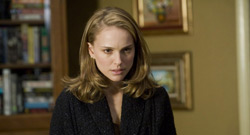
For the most part, Sheridan is faithful to the source material and yet not overly imitative. He gives the film a fresh, more polished visual look—thanks in large part to the wintry, crystalline photography (shot in New Mexico) by Frederick Elmes (Blue Velvet, Synecdoche, New York)—and enlists the talents of U2 for a pair of new songs. But other than that, Brothers is a pretty straightforward remake that repurposes good drama and evocative ideas for an American audience.
Brothers is a film that asks a few big questions. On one hand, there is the question of the domestic impact of war. Early in the film we see how the elder Cahill (Shepard), a Vietnam veteran, seems hardened and distant from his family. Then we witness his son Sam coming back from Afghanistan shellshocked, angry, and unable to relate to civilian life. He’s a survivor of war, but will Sam be able to live again? And will he be the father and husband he once was or might have been? This is the question Sheridan hones in on the most.
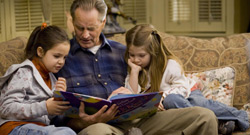
But there is also the question of brotherhood—much more subtly explored, even if the title indicates otherwise. Sam and Tommy are seemingly opposites at the outset of the film. One is the athletic, well-behaved son who pleases his parents at every turn. The other is a chronically disappointing, erratic screw-up who seems to have always made the wrong choices. But how much are the brothers really different? As the film progresses, and the roles begin to reverse, we start to wonder. We wonder about things like nature vs. nurture, about how much our lives are determined by circumstance rather than our own volition.
Throughout literature and storytelling (going back to Cain/Abel), the brother dynamic has dramatically embodied human traits like jealousy, pride, loyalty and love. All of this is present in Brothers, even if rendered in slightly more surface relief than the Bible or something like Shakespeare. But this is just a movie, after all, and a small-ish one at that. It’s a little slice of life that rings true and painful, portraying the complexity of relationships with a tender touch—even if it’s just the tip of a much bigger iceberg. But at least it gets us thinking about the iceberg.
Talk About It
Discussion starters- How should we evaluate Sam’s actions while he was held captive in Afghanistan? Is there a “right” or “wrong” to what he did?
- Do you think Sam will be able to “live again” as he hopes to? How will this happen?
- What does the film say about how war impacts the civilian life? Do you think the filmmakers are making an anti-war statement?
The Family Corner
For parents to considerBrothers is rated R for language and some disturbing violent content. The film has its share of strong language, but more distressing are torture scenes in Afghanistan when characters are made to do disturbing things. There is also a bit of fighting/violence on the home front, and a general mood of stress and dread throughout. Families should think twice about watching the film with younger children, though it may be appropriate for older teens to watch with their parents—and good discussion fodder for older teens and 20-somethings who are of prime “military age.”
Photos © Lionsgate
Copyright © 2009 Christianity Today. Click for reprint information.



